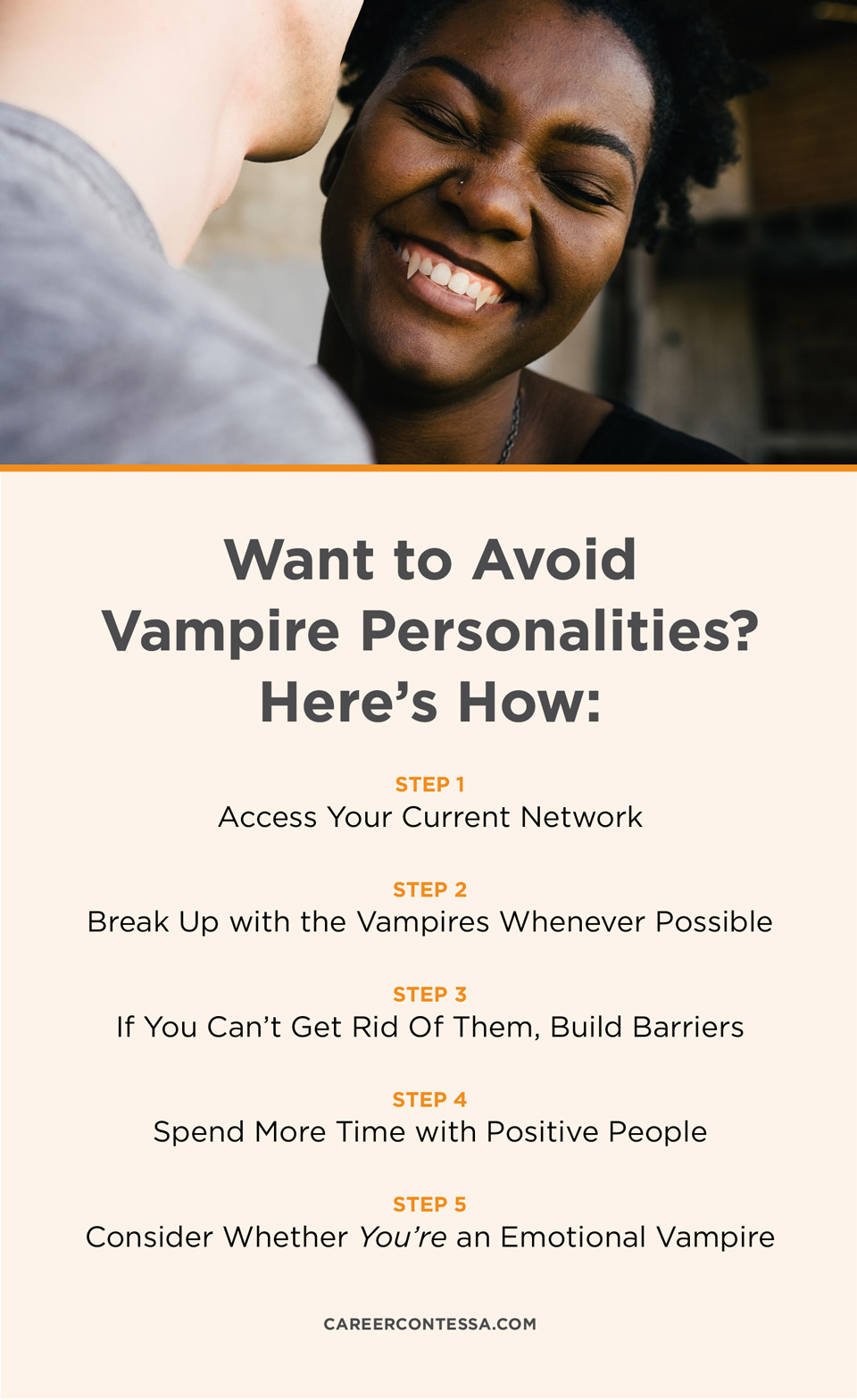Welcome to Work Scaries Week, where we're focusing on the bad (and sometimes downright terrifying) aspects of office culture.
You’re on your way to dinner with a friend you’ve had for years. After a successful day producing a ton of work, you’re making plans to head home afterward to work on your side hustle into the night. Cut to two hours later, and you’re inexplicably wiped. Fatigued. Exhausted. Ready for bed and Netflix.
Sound familiar? There’s a wide variety of reasons you might leave a dinner feeling low—one too many glasses of wine being one of them—but if you can’t quite put your finger on why, it’s possible you’ve been the victim of a vampire.
Yes, a vampire. The term isn’t as fantastic as it sounds—in fact, it’s a commonly used term in psychology for personality types that feed off others’ energy, whether it’s creative or emotional. Both follow similar patterns, but here’s the simplest breakdown:
The Emotional Vampire
Chances are you have at least one of these in your social circle—and actually, probably several.
In most cases, emotional vampirism isn’t a one-time event. Do you have a friend who always seems to be having a hard time? Maybe anytime you meet up for a happy hour or coffee, you spend that time comforting her, suggesting solutions to problems that she immediately disregards, talking her up when she’s feeling down on herself yet again. Afterward, chances are your energy takes a nosedive by the time you’re through.
Emotional vampires are everywhere, and often, you don’t see them coming. In an
interview with Bustle, Dr. Judith Orloff put it like this: "An emotional vampire can be anyone," says Orloff. "I once had a hairdresser who was so negative that I always left the salon feeling terrible about myself, and totally drained."
Bustle goes on to describe other examples, like acerbic aunts or “the coworker who complains about her job until you're too exhausted to get your own work done.” And Orloff actually broke down the five most common types of vampires (think narcissists, drama queens…) in
this piece for
Psychology Today. But the one thing they all have in common is the eerie feeling of burnout you get after spending time in their presence—whether that’s fatigue or increased anxiety.
The Creative Vampires
Then there are the creative vampires. These are all too common in offices. At a conference I attended a few years back, Austin Kleon, the author
of Steal Like an Artist, once described Picasso as the most obvious example of one. Picasso used to invite other artists to his studio for visits that would span hours. Several of them made note in their journals that after a day with Picasso, they’d leave exhausted and find themselves unable to work in their own studios. Picasso, meanwhile, would go back to his, working into the early hours of the morning. He’d sucked their creativity and innovation out of them, harnessing it for his own purposes.
Creative vampires are particularly awful at the office because they prevent you from doing your best work. It can be the coworker who asks you to check her work for her—even when it’s not your job—leaving you feeling drained by the time you sit down to write your own assignments. Or it’s the person who can’t stop asking you questions, even when she knows you’re in the midst of head-down focus time. In each of these cases, you’re left feeling like you can’t concentrate hard enough or think creatively enough.

What Do You Do to Avoid Them?
Step 1: Take Stock
Sometimes our friends are just going through a hard time and they need some extra care and attention. Same goes for a coworker who’s having a rough week or struggling with a huge workload. The key here is that those moments are temporary. Start by thinking about the friends or colleagues that leave you feeling drained regularly. What is it that makes it so exhausting for you?
Step 2: Break Up with the Vampires Whenever Possible
Yes, we’re talking vamps, but this isn’t Buffy. Even if you’ve already let those vampires in your front door, you can kick them out again. As Orloff explains (this time
to HuffPost), “Whenever possible, eliminate drainers from your life.” When it comes to friends who are complete drains, it’s best to take a step back.
This can feel strange at first because emotional vampires specialize in sucking you in (before, you know, sucking out your energy). Try not to let yourself feel guilty about saying no. If a friend tends to ruin your energy and mood every time you grab a glass of wine with her, stop making plans or suggest group hangs instead with other people who will help preserve and support a more positive conversation. It’s difficult at first, but you’ll thank yourself when you feel better later.
Step 3: If You Can’t Get Rid Of Them, Build Barriers
You can’t get rid of your emotionally draining coworker or boss, but you can take steps to prevent them from harnessing your energy. According to Orloff,
the first step is to stay calm—avoiding their bait. And
according to Fast Company, you’ll also want to let their bad energy pass over you whenever possible. Accept that their bad mood exists but doesn’t have to affect yours. Let’s say you’re at a dinner party and the friend across the table can’t seem to do anything but talk trash about other people. Make it your priority to talk to others at the table who aren’t engaging and to redirect the conversation back to more constructive topics. Simply overrule her. The less you engage, the less access you give them to your own emotional wellbeing.
Step 4: Spend More Time with Positive People
When you took stock of the people you know in order to figure out who might be an emotional vampire, chances are you also recognized some people who you really, really love spending time with. Maybe it’s the friend who’s always encouraged you to pursue ideas and side interests or the coworker who’s always down to jump into a new project with you for the thrill of learning something new. Whoever it is, now that you’ve freed up some time by not spending hours with emotional vampires, you have more space to spend time with them. Make an active effort to see more of them.
Step 5: Consider Whether You’re an Emotional Vampire
Before we end this article, we should mention the elephant in the room: the possibility that you are an emotional vampire. Think about the sort of conversations you tend to have with friends or coworkers. Are you complaining too much? Asking for too much attentional unfairly? Take a serious look at your own social interactions and make it a goal to contribute more positively to all of your conversations and friendships. Even if you’re not an emotional vampire per se, focusing on talking about ideas, not talking smack about people whenever you meet up with a friend will improve the experience for everyone. That’s not to say you can’t vent now and again, just don’t suck. (Get it?)
Have you encountered emotional vampires? What did you do?











